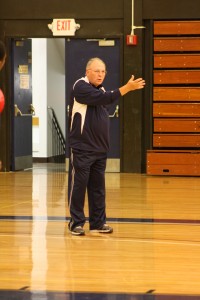Ken Libby, assistant basketball coach, served in South Korea during the Vietnam War
By: Spencer Gleason
-Sports Editor

A few years ago, assistant coach for the STLCC men’s basketball team, Ken Libby, visited Washington D.C. He went to visit “The Wall” — the Vietnam Memorial. Libby had a friend that was drafted around the same time he was in August 1970. Libby found his friend’s name.
“That is when it kind of gets you,” Libby, now 64, said. “There were a couple of other guys that I taught at school with in Moberly, Mo., too — one grade school, one high school — and I see their name on “The Wall.” That will kind of move you. That was the more serious side of that stuff.”
Libby, who grew up in Moberly, Mo., was drafted into the military in the fifteenth round during his first year of teaching and coaching basketball, but his superintendent gave him a lifeline. He made a deal with the draft board by saying, “it would be too hard to find somebody to coach and teach” in the middle of the school year.
Summer came — June, then July. Libby still had not heard back from his draft board, so he kept living life normally.
“I was not going to go knock on her door,” Libby said. “I was expecting to hear from her since this was just a favor with my superintendent to leave me alone for a little bit.”
As the dog days of summer in 1970 drew on, Libby, then 22, went to Chicago to spend time with a friend from college. There were good job opportunities and the two of them planned to get an apartment together.
“I got an interview teaching freshman social studies and coaching freshman basketball at a good high school in suburbia Chicago and I got the job,” Libby said. “I was told to come by the next day and they would have the contract typed up for me to sign.”
After a night of celebrating, Libby and his friend returned home to be greeted by his friend’s mom. Libby was not going able to sign on the dotted line for the teaching job after all.
“She is still awake and she tells me, ‘You need to call your mom. She has called me a hundred times. You have some important mail that she needs to tell you about,’” Libby said. “Well, I knew. I just knew. I called my mom and it was a letter from Richard Nixon. I was to report within 14 days and I was inducted into the United States Army.”
Libby reported 418 miles away from his home of Moberly, Mo. for basic training at Fort Campbell, Ky. and his journey had begun. Following basic training, the army sent Libby to Fort Sam Houston in Texas for medical training to become a medic.
“Being a medic, they all went to Vietnam every single week,” Libby said. “My week was the first week in several years that every medic was not assigned to go to Vietnam.”
While Libby saw friends being sent to Germany and Hawaii, he was sent to South Korea. Before he was sent to South Korea, Libby stopped at Fort Louis, Wash. to prepare for the trip across the ocean.
“The army changed their mind,” Libby said. “They need more medics in Vietnam, so half of [the medics that were with me] went to Vietnam.”
Libby continued on his way to South Korea. “Then I get to South Korea and they put us in a holding company of 200 guys and half of them get to Vietnam,” Libby said.
Libby stayed in South Korea.
“Then four of us go to the 125 medical detachment in Ouijongbu, South Korea up in the mountains real close to the Demilitarize Zone (D.M.Z.),” Libby said. “Of the four, within two days, two of them were told they were going to Vietnam.”
Four different times Libby was on the verge of being sent to the news capitol of the world at that time. Four different times, Libby lucked out.
“The odds from going from hundreds down to four and I am one of two that did not go,” Libby said. “I thought that I had won the lottery already by doing that.”
Libby’s job with the 125 medical detachment was doing whatever needed to be done. He worked in the shop room, in the records and the supply room.
“I was kind of like Radar O’Reilly for that medical detachment,” Libby said.
“The only real treatment of gunshot and buck shot was when some South Korea soldiers were mad at their commanding officer and they threatened him with a tank mine that they had found,” Libby said. “They got into pushing and shoving and it blew up and killed about three or four of them and then a bunch of them were injured. They brought those guys into the dispensary and picked out pieces of shrapnel.”
Libby’s closest call was when he was driving a pregnant women in the back of his ambulance.
“A Korean woman who was married to a U.S. soldier, that’s why she got our treatment, was in labor and she was in the back screaming and yelling,” Libby said. “I’m thinking, ‘Oh gosh, I’m not ready to be birthing any babies here.’ I had seen a film. That was it. I got her to the 43 [Mobil Army Surgical Hospital] M.A.S.H. unit on time, though. That was my only scare in the ambulance.”
While living in a country that was always on the cusp of breaking out into war, Libby saw jets fly at a low trajectory toward the D.M.Z., but they would never fly over the border, crossing the line.
“They would just screw with each other,” Libby said.
After witnessing being on the brink of war, Libby was finally able to go home after 18 months of service.
“I got out Feb. 29, 1972. It was a leap year that year,” Libby said. “I had already enrolled at Northeast Missouri State to be a grad assistant for basketball and get my masters [degree] in guidance and counseling.”
As much as it could be, a normal life could start again.











